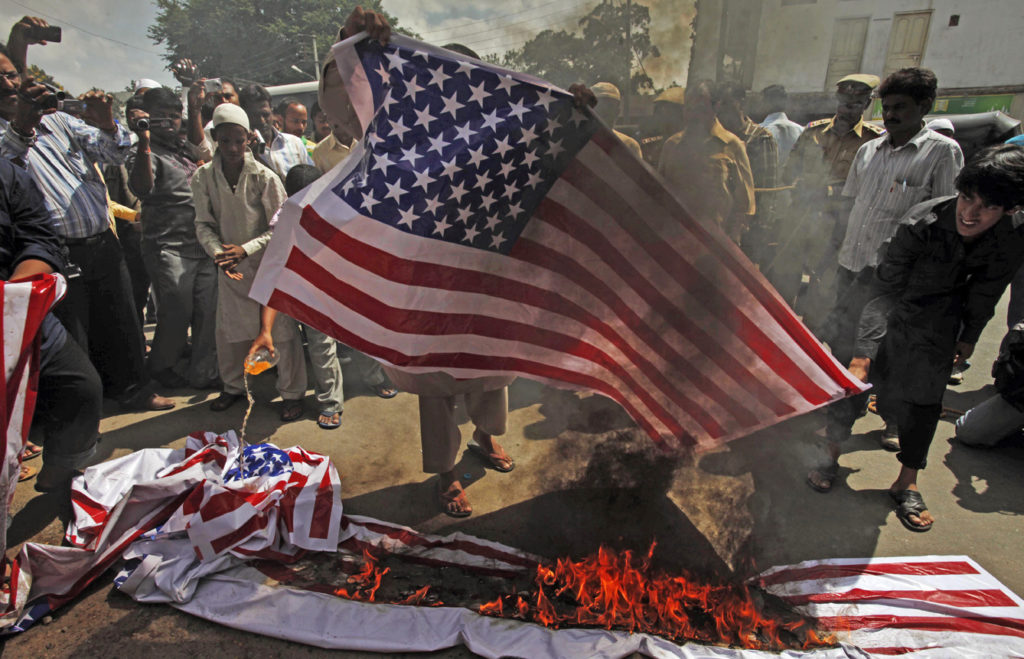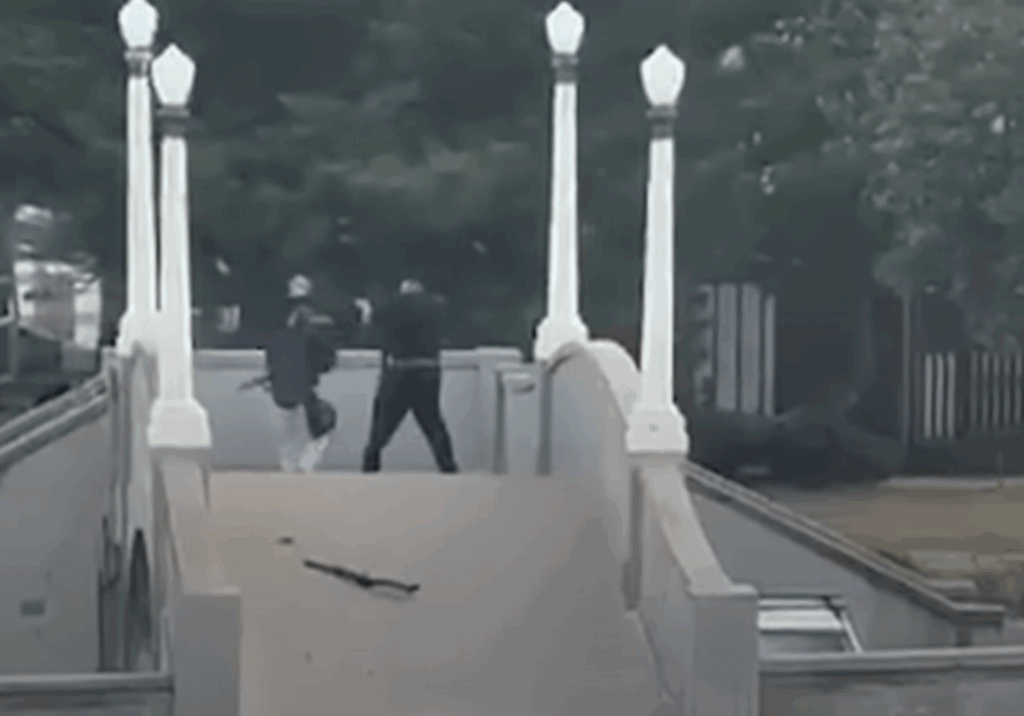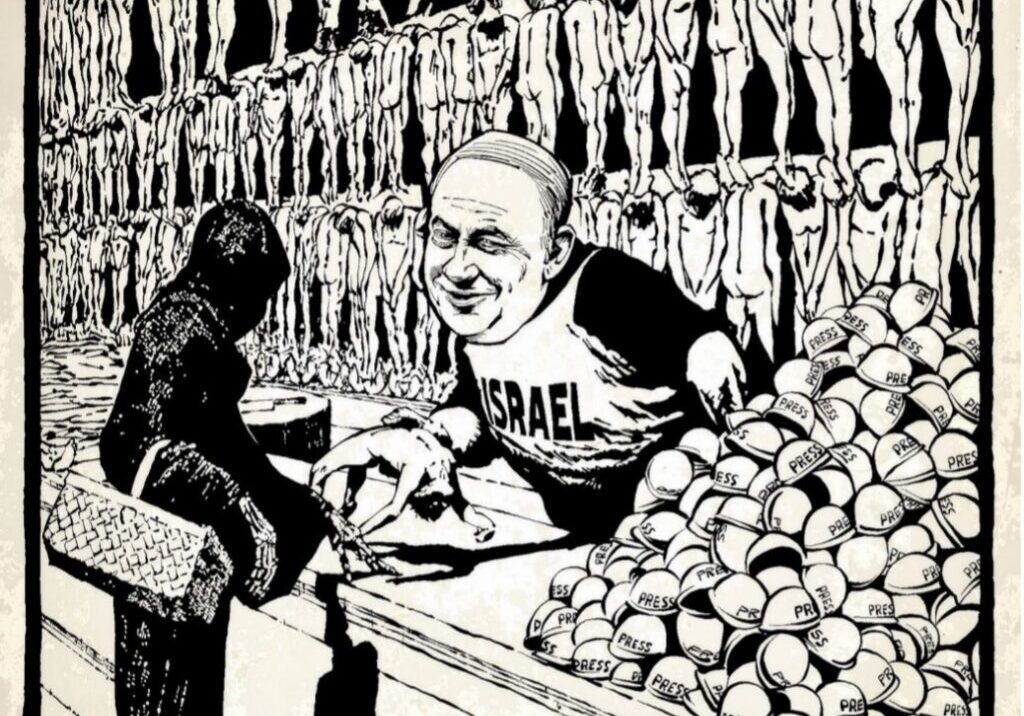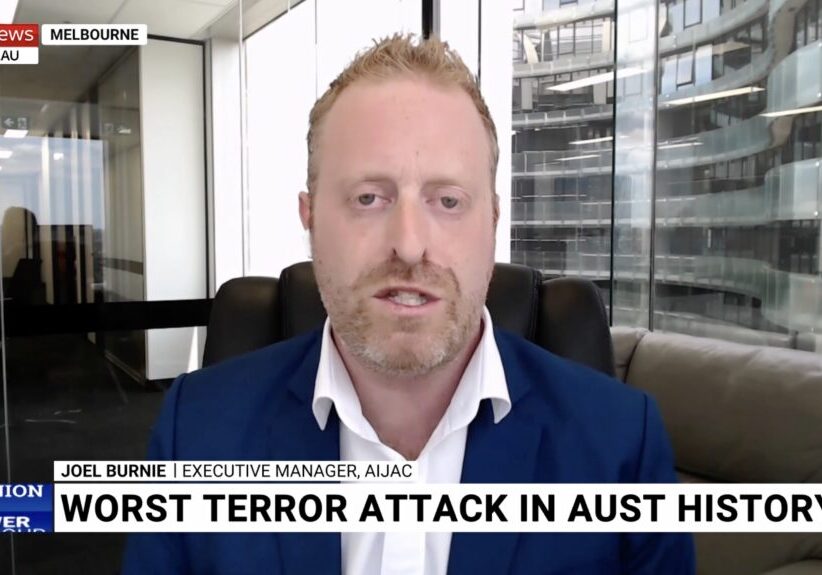Australia/Israel Review
The Politics of Rage
Sep 27, 2012 | Walter Russell Mead

Walter Russell Mead
Coming in the middle of the American campaign season and timed to coincide with the eleventh anniversary of the 9/11 attacks, the violence now shaking the Middle East has inevitably turned into a US domestic issue.
If Americans and other Westerners are going to understand what’s going on and process it effectively, the first thing we’ve got to realise is that this isn’t all about us. The riots in Cairo are basically part of a local power struggle. Radical Salafists are in a power struggle with the Muslim Brotherhood; attacking the US Embassy forces President Morsi (as the radical strategists presumably expected) to side with the US, however slowly or reluctantly. That’s a win for the radicals, who want to tar the Muslim Brotherhood as soft appeasers who side with the Americans against their own outraged people.
Striking at the Embassy pushes Egyptian politics in a more radical direction short term, and over the medium term it weakens the Muslim Brotherhood and strengthens the more radical groups. After these last attacks, you are not going to see many tourists or foreign investors traipsing to Egypt anytime soon. The already struggling Egyptian economy has taken a hit that will cut employment. That’s going to hurt, and it’s going to reduce the popularity of the government, much to the benefit of the radicals who hope to replace it.
In many other places, from the West Bank and Gaza to Yemen and Tunisia, the protest movements are also more important for what they mean in local politics than about global policy. Radical movements and imams who work with them seized eagerly on the YouTube film to generate popular outrage and use mob anger to make a public statement. Moderates who speak against violence or try to cool matters look like American puppets; this is the kind of issue the radicals love, and we can expect them to milk it for all it is worth.
It’s hard at this point to assess how much of this was at least quasi-spontaneous public reaction and how much reactions were stimulated and even shaped by organised radical groups. In Cairo, there seems to have been a mix of angry street protesters demonstrating more or less at random and organised activists with a much more definite agenda, but we will not really know the answers for some time – if ever. However, not all that many Middle Eastern Muslims are in the habit of trolling YouTube for blasphemous videos. That the protests came when they did and that in at least two cases (Egypt and Libya) well organised cadres used those protests to make more dramatic actions strongly suggests that something more than simple spontaneous outrage was at work.
Libya looks even more like a planned operation. There, radicals apparently allied to al-Qaeda in some vague way and possibly cooperating with Gaddafi loyalists made what appears at this point to be a well planned, coordinated military strike against the Consulate in Benghazi. Here the timing seemed clearly less about the film than about the 9/11 anniversary, and it looks more like a message from hard core radicals rather than explosion of popular rage.
Again, we will know more as the smoke clears and at this point we are talking about possibilities rather than conclusions, but ruling out some kind of planning in at least some of the incidents on the basis of what we now see is naive.
In any case, the biggest worry now may not be further attacks on US embassies and consulates in the region; security is very tight at those facilities now and unless something very unusual happens, crowds may gather outside the walls, but perimeters will not be breached. There are no guarantees, but the US has been thinking hard about these issues since well before 9/11.
The biggest bomb in the region right now, and let us hope and pray that it doesn’t go off, involves the relations between Coptic Christians and Islamic radicals (and the mobs they can command) in Egypt. The news is only slowly getting to Egypt that the film – one of the stupidest pieces of hack work I myself have seen – was made by a Coptic Christian in the US. When and if the film is actually viewed in its 14 minutes of amateurism and low production values, its intention to vent the rage and frustration some Copts feel about their treatment in Egypt will be clear. It is an angry, embittered and perhaps not very spiritual Copt’s view of the way Islam treats his community – and a cry of anger and frustration.
This is the kind of provocation – even though by a marginal member of the community and disavowed by the leaders – that can light firestorms of communal violence and cleansing. That is what Egypt must watch out for right now, and if you don’t like watching crowds marching against the US Embassy, imagine what could happen if angry mobs with clubs, axes and guns head into the Christian neighbourhoods of Cairo.
Episodes of mass violence and killing of religious minorities throughout the former territories of the Ottoman Empire – from the Danube to the Euphrates and the Nile – have been all too common in the last 150 years. Sometimes the victims have been Muslims (most recently in Srebenica but between 1850 and the aftermath of World War One there were plenty of expulsions and massacres of Muslims as Ottoman power retreated from Europe); on an even larger scale in the modern Middle East they have been Christians and, sometimes, Jews and adherents to variant forms of Islam. If anybody wants to think about worst case scenarios in Egypt, this is the one to look at. Armenians, Chaldean Christians, most recently the Christians in Iraq: it has happened before and though one very much wants to discount the possibility, things like this could well happen again.
The person who comes out of all this looking smartest is Samuel Huntington. His book on the “Clash of Civilisations” was widely and unfairly trashed as predicting an inevitable conflict between Islam and the West, and he was also accused of ‘demonising’ Islam. That’s not what I get from his book. As I understand it, Huntington’s core thesis was that while good relations between countries and people with roots in different civilisations are possible and ought to be promoted, civilisational fault lines often lead to misunderstandings and tensions that can (not must, but can) lead to violence and when conflicts do occur, civilisational differences can make those conflicts worse.
The last few days are a textbook example of the forces he warned about.
The Islamic value – and it a worthy one on its own terms and would certainly have been understandable to our Western predecessors who punished blasphemy very severely – of prohibiting insults to the Prophet of Islam clashes directly with the modern Western value of free expression. To the Western eye (and it’s a perspective I share), a murderous riot in the name of a religion is a worse sin and deeper, uglier form of blasphemy than any film could ever hope to be.
To kill someone created in the image of God because you don’t like the way God or one of his servants has been depicted in an artistic performance strikes Westerners as an obscene perversion of religion – something that only a hate-filled fanatic or an ignorant fool could do.
When acts like this take place all over the Islamic world, the message to many non-Muslims is that the Islamophobes are right: Islam as a religion promotes hatred, bigotry and ignorance. This will be held by many people to be a revelation of the “true” face of a violent religion. Or, alternatively, some will say that while Islam might be a good enough religion taken alone, Middle Easterners are savage and ignorant haters who cannot be trusted and whose culture (rather than their religion) is one that blends intemperance and stupidity into an ugly stew of hate.
I don’t think either Islam or Middle Eastern culture can be so simply categorised; that’s not my point. My point is that the gap between Muslims and non-Muslims has grown wider; the reaction of the Western world and the Islamic world to these recent events drives us farther apart. The gulf of suspicion between the worlds has grown deeper. Europeans will worry more and be less welcoming to Muslim immigrants. Many Americans will draw closer to Israel, be more concerned about any signs of increase in the US Islamic population and have a harder time trusting the Muslims in our midst.
Those reactions in turn will make Muslims in Europe, North America and the Islamic-majority parts of the world feel more suspicious, more threatened and more alienated.
These are some of the chains of causation Huntington was thinking of when he warned that the world faced the possibility for this kind of clash. The Obama Administration has worked very hard to reduce the chance of this kind of division, but it seems clear at this point that a few hours can undermine the efforts of many years.
Unfortunately, Islamic radicals are deliberately hoping to promote a clash of civilisations in the belief that a climate of polarisation will strengthen their political power in the world of Islam. Attacking the embassy in Cairo is an effort to push Egyptian opinion in a more radical direction, but the radicals hope that this is part of a larger push that will bring them to power across the Islamic world. Like Boko Haram in Nigeria, which hopes to provoke a religious war with the Christians partly in order to achieve power in the Muslim North, radicals use the prospect of a clash of civilisations to further their own cause throughout the troubled Islamic world.
The US and more generally the West (including Russia, so perhaps I should say the “Christian world” instead) has tried several approaches to this situation and so far we haven’t been happy with the results. Confrontation, reconciliation, cooperation: there are good arguments to be made for them all, but in practice none of them seem to make the problem go away.
One thing should be absolutely clear to Americans and their allies. Since 9/11, we’ve had two American presidents who attempted to deal with our problems in the Middle East. Both presidents notched up some achievements – but neither president got the job done.
The gap between American opinion and opinion in much of the Islamic world is as wide now as it was when President Obama flew to Cairo; things are not getting better.
Walter Russell Mead is James Clarke Chace Professor of Foreign Affairs and Humanities at Bard College and Editor-at-Large of The American Interest magazine. He is the author numerous books on American foreign policy, including most recently God and Gold: Britain, America, and the Making of the Modern World (Knopf, 2007). © The American Interest (www.the-american-interest.com), reprinted by permission, all rights reserved.
Tags: Islamic Extremism






